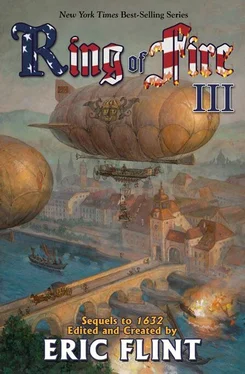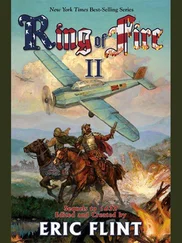Eric Flint - Ring of Fire III
Здесь есть возможность читать онлайн «Eric Flint - Ring of Fire III» весь текст электронной книги совершенно бесплатно (целиком полную версию без сокращений). В некоторых случаях можно слушать аудио, скачать через торрент в формате fb2 и присутствует краткое содержание. Жанр: Альтернативная история, на английском языке. Описание произведения, (предисловие) а так же отзывы посетителей доступны на портале библиотеки ЛибКат.
- Название:Ring of Fire III
- Автор:
- Жанр:
- Год:неизвестен
- ISBN:нет данных
- Рейтинг книги:3 / 5. Голосов: 1
-
Избранное:Добавить в избранное
- Отзывы:
-
Ваша оценка:
- 60
- 1
- 2
- 3
- 4
- 5
Ring of Fire III: краткое содержание, описание и аннотация
Предлагаем к чтению аннотацию, описание, краткое содержание или предисловие (зависит от того, что написал сам автор книги «Ring of Fire III»). Если вы не нашли необходимую информацию о книге — напишите в комментариях, мы постараемся отыскать её.
Ring of Fire III — читать онлайн бесплатно полную книгу (весь текст) целиком
Ниже представлен текст книги, разбитый по страницам. Система сохранения места последней прочитанной страницы, позволяет с удобством читать онлайн бесплатно книгу «Ring of Fire III», без необходимости каждый раз заново искать на чём Вы остановились. Поставьте закладку, и сможете в любой момент перейти на страницу, на которой закончили чтение.
Интервал:
Закладка:
B. That being so, General Schmidt himself-now already marching his National Guard division to come to the assistance of Regensburg-would have no choice but to divert his troops in order to rescue Major Simpson. Who, by then, would be engaged in a desperate last stand against that selfsame Bavarian wickedness.
C. In which case, Duke Maximilian, a man whose wickedness was only matched by his cunning, would immediately launch the most furious assaults upon Regensburg, intending to seize the city while it remained lightly defended. In which project he would almost certainly succeed, since the relieving force under General Schmidt was unfortunately preoccupied rescuing Major Simpson from the predicament he had been placed in by the slothful and selfish behavior of the authorities of the very same city about to fall into the hands of Bavarian wickedness.
D. Which wickedness, he reminded the officials listening to his radio message, had been demonstrated not five years earlier in the unspeakably barbaric sack of Magdeburg, carried out largely by troops on Maximilian’s payroll.
So there they were, three full barrels of gasoline, ready to be loaded as soon as the Pelican was tethered. With six more barrels, they were assured, already on their way to the airfield.
Rita didn’t wait for those next barrels. Stefano told her that they now had enough fuel for the burners and engines to stay in operation another day. So she ordered him to fly back to the location of the Danube Regiment.
That location had moved a few miles downstream, but only a few. Being married to a soldier, Rita had been abstractly aware that large military forces other than cavalry units-and those also, more often than not-simply could not and did not move quickly across a countryside. But seeing the phenomenon for herself at first hand drove home that reality in a way that listening to Tom talking with fellow officers never had.
The problem began with the very term that people used to refer to the process. They would say that an army “marched.”
Marched. The word brought up images of parades, or newsreels Rita had seen of GIs during World War II passing through a bombed-out French or German town. No longer in formation, just walking. But unless they were moving carefully because there were enemy troops in the immediate vicinity, they were still making quite rapid progress. A person in good physical condition, like a young soldier, can easily walk two miles in an hour, even carrying a heavy pack, and maintain that rate for hours. They can move fifteen or twenty or even twenty-five miles in a day.
But that presupposed, first of all, twentieth-century macadamized roads. Wide roads, at that. Rita didn’t usually think of up-time two-lane country roads as being “wide,” but compared to the roads that existed in central Europe in 1636 they were practically boulevards. A standard up-time lane measured somewhere between ten and twelve feet, which made a two-lane road somewhere between twenty and twenty-four feet wide-not even counting whatever shoulders might exist. Half a dozen men could comfortably march abreast on that sort of road. Place them in rows spaced six feet apart-again, a very comfortable distance-and you could fit an entire regiment of a thousand men in a stretch of road that was less than a quarter of a mile long.
And those World War II-era newsreels usually only showed the infantrymen, or perhaps the armored fighting vehicles. They rarely showed everything else that was needed to keep an army marching, such as the long line of trucks carrying all the necessary supplies, equipment and ammunition. You saw the quickly-moving teeth of an army, not the massive tail that came behind it-a tail which was itself mechanized and therefore able to move pretty quickly.
None of that applied here. The road that Tom’s men and the refugees were traveling on that ran more-or-less alongside the north bank of the Danube was no more than ten feet wide and often narrower than that. It was not macadamized. In fact, it was rarely even a gravel road. Most of it was just a dirt road. Hardened by the passage of many feet and hooves and wagon wheels over the years, to be sure, but still just a dirt road.
And now, in mid-January, very often covered in thin ice and snow. The ice and snow didn’t last long, of course, with hundreds of people and livestock moving over it. No, it melted and started turning a dirt road into a mud road, at least in patches.
Things weren’t helped any, of course, by the fact that Tom had decided to put the refugees ahead of the army so his soldiers could provide them with some protection from the pursuing Bavarians. But, in truth, that probably wasn’t slowing them down all that much. There simply wasn’t any way to move some fifteen hundred people and close to two hundred horses, mules and oxen at anything faster than a crawl.
From high in the air, the army and its accompanying crowd of refugees made Rita think of a giant caterpillar inching its way down the Danube. Just as with a caterpillar, the center would expand as the soldiers in the rear pressed against the refugees ahead of them, forcing some of the refugees to move off the road. Then the officers would order a halt while the refugees were able to move a little farther, and the whole process repeated itself.
The situation would have been horrendous if the enemy cavalry had been doing what it should have been doing, moving ahead of the column and tearing at its flank. But the cavalry was still nowhere to be seen. Not from the ground, at least. From her vantage point two thousand feet in the air, Rita could see cavalry units moving about in the distance. But the closest cluster of Bavarian horsemen she could spot was at least half a mile from the river.
She wondered why the Bavarian commander, whoever he might be, was tolerating the state of affairs. If she’d been in his position, she’d have blown her stack by now.
Colonel von Schnetter blew his stack no fewer than four times before the sun finally set that day. He kept his mounted adjutants racing all over the landscape, bearing orders-first, firm; then, stern; then, peremptory; then, furious and profane-to the cavalry commander, demanding that he leave off his so-called “foraging” and attend to his proper duties.
Colonel Johann von Troiberz ignored each and every one of those orders. He didn’t refuse to obey, he simply made no response at all. He was able to do that because the orders given by General von Lintelo had not specifically placed von Troiberz under von Schnetter’s command. Most likely, the general had simply assumed that the cavalry commander would have the sense of a goose-or, more to the point, wasn’t desperately trying to cover up the fact that he’d sold off his cavalry unit’s supplies.
Von Troiberz had done that the day before the assault on Ingolstadt began. He knew that the assault was predicated on treachery and was primarily planned as an infantry affair. Thereafter, his cavalrymen would have access to the city’s resources and could surely obtain replacements for vanished supplies within a couple of days. So he calculated that he could safely sell off the supplies before the assault began. Who pays attention to such things as hay and oats?
He hadn’t considered the possibility that he might be ordered into an immediate cavalry action to pursue enemy soldiers who had managed to escape the city. That had been a tense moment, when he realized what might be in the offing at von Lintelo’s staff meeting after the successful seizure of Ingolstadt. But von Troiberz had acted quickly-he was still patting himself on the back for it-and immediately volunteered his own force for the mission. Secure in his knowledge that von Lintelo had an inexplicable dislike for him and always favored one of his pets. So he wouldn’t be given the mission anyway.
Читать дальшеИнтервал:
Закладка:
Похожие книги на «Ring of Fire III»
Представляем Вашему вниманию похожие книги на «Ring of Fire III» списком для выбора. Мы отобрали схожую по названию и смыслу литературу в надежде предоставить читателям больше вариантов отыскать новые, интересные, ещё непрочитанные произведения.
Обсуждение, отзывы о книге «Ring of Fire III» и просто собственные мнения читателей. Оставьте ваши комментарии, напишите, что Вы думаете о произведении, его смысле или главных героях. Укажите что конкретно понравилось, а что нет, и почему Вы так считаете.











